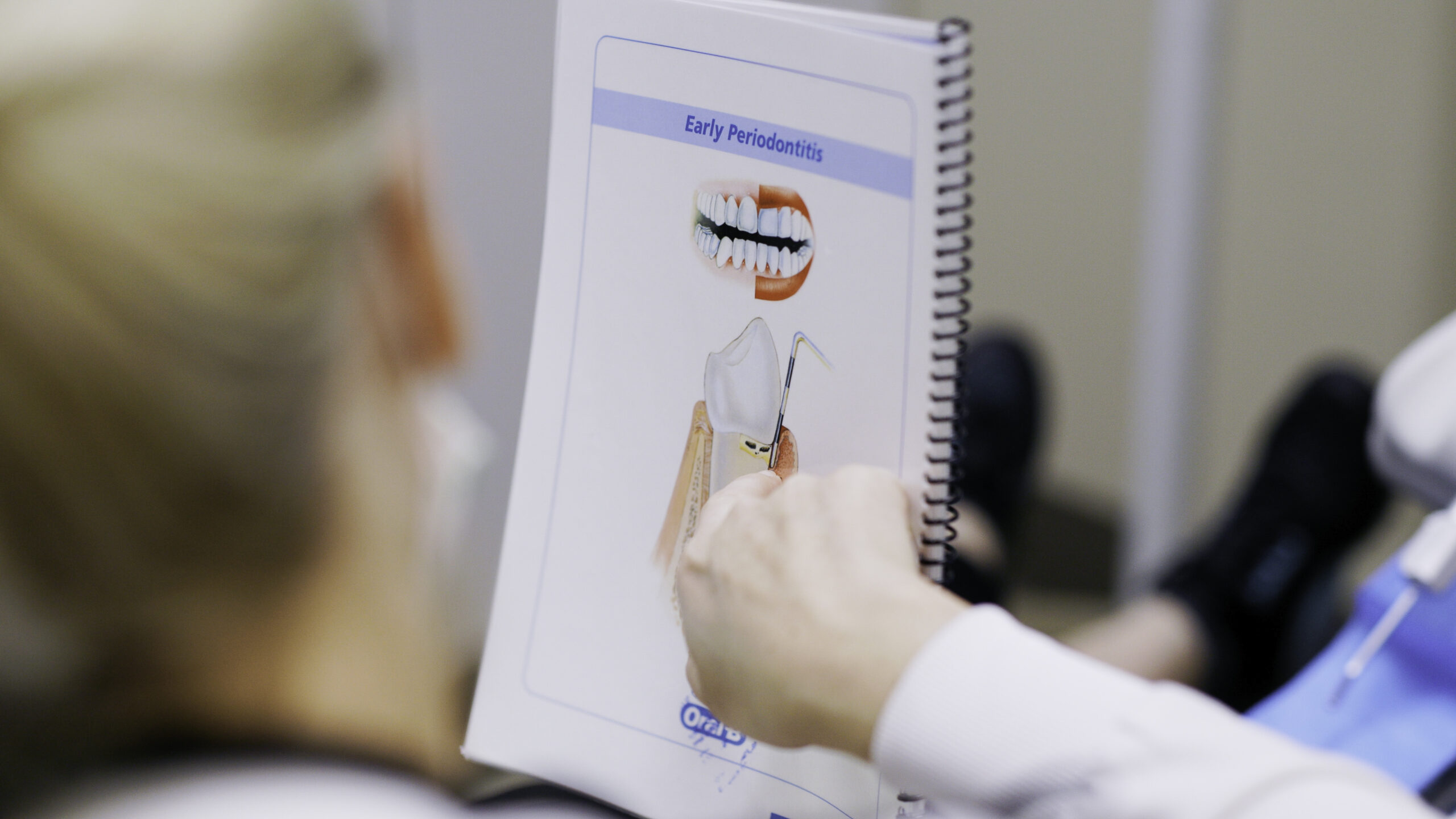Healthy Gums: What Is Periodontal Disease?

Also called gum disease, periodontal disease is an infection that can damage the gums and bones that hold the teeth in place. Gums that are healthy should appear pink and firm around the teeth. This tissue can become infected slowly, so it is important to understand the causes and symptoms of diseased gums.
Diagnosis and causes of periodontal disease
A dentist can assess gum health and diagnose periodontal disease based on the severity of the symptoms. During evaluation, a tiny ruler is used to measure the depth of any gum pockets. Healthy pockets are less than 3 millimeters deep. A dentist can look for other symptoms as well:
- Red and swollen gums
- Gums that bleed easily when flossed
- Persistent bad breath
- Shifting teeth
- Teeth discoloration
- Receding gums
- Sensitive teeth
Periodontal disease most often begins with dental plaque buildup around the teeth. However, there are other factors that can impact gum health.
Dental plaque
Plaque is a bacterial film that grows on the surfaces of teeth. As plaque builds up, it produces toxins that irritate the gums and can lead to gum disease.
Hormonal changes
Changes in hormones can make the gums more sensitive and increase the risk of inflammation. Hormonal changes may occur during puberty, menstruation, pregnancy or menopause.
Smoking
Chemicals found in tobacco products affect the flow of saliva. This makes it easier for bacteria to grow.
Medical history
Many autoimmune diseases can affect oral health because a compromised immune system enables bacteria to thrive. Diabetes, heart disease and cancer are linked to a higher risk of periodontal disease. A family history of gum problems increases the likelihood of getting it as well.
Diet and medications
Some painkillers, antidepressants and antihistamines are known to decrease saliva, causing dry mouth and increased plaque accumulation. A diet that is high in carbohydrates, sugars and starches can alter the oral pH level and increase the risk of gum disease.
Stages of periodontal disease
Periodontal disease is a common condition. Left untreated, it gradually progresses through more serious stages.
Gingivitis
The early stage of gum disease is known as gingivitis. Gums during this stage may bleed easily during brushing and flossing. Gingivitis can often be reversed with improved oral hygiene routines and regular dental visits.
Periodontitis
Periodontitis is more serious and occurs when the gums pull away from the teeth. Small pockets form between the gums and teeth and allow the infection to spread to the soft tissues and bones. Moderate bone loss can occur at this stage. Treatment involves removing plaque from the gum pockets and smoothing the roots of the teeth so the gums can reattach. Antibiotics can also be used to treat the infection.
Advanced periodontitis
When gums reach the advanced periodontitis stage, the teeth can loosen and fall out as the bone support further deteriorates. The infected gums can become prone to oozing pus. This stage may require gum surgery and tooth extraction.
Conclusion
Identifying and treating gum disease early can help prevent tooth loss. It is important that to consult with a dentist if you notice any signs associated with periodontal disease.
Request an appointment here: https://www.stgeorgedentalcare.com or call St. George Dental Care at (435) 628-9099 for an appointment in our St George office.
Check out what others are saying about our services on Yelp: Read our Yelp reviews.
Recent Posts
We know that life is busy. Between work, school runs, and family commitments, finding time for healthcare can be a challenge. One of the most common questions we hear at the front desk isn't just about cost or comfort; it's about the schedule. Patients want to know, "How long does dental treatment take?" Whether you…
For many people, the thought of sitting in a dental chair triggers a wave of unease. It is important to know that dental anxiety is incredibly common, and feeling this way doesn't mean you are irrational or weak. Many patients avoid appointments for years simply because the fear feels too overwhelming to manage.However, modern dentistry…
Waking up to a throbbing toothache can be alarming and exhausting. Pain that intensifies after sundown is a common complaint and often signals an underlying issue that requires professional attention. At St. George Dental Care, we understand how stressful this can be, and we're here to provide clarity and care when you need it most.…
Understanding the cost of dental care is a major concern for many people. You want to maintain your oral health without facing unexpected expenses. While it is impossible to provide a single price for a dental visit, we can explain the factors that influence cost and help you feel better prepared for your appointment. Our…


